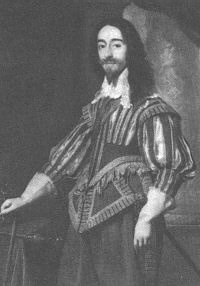
- The Siege group
- Home
- Who we are
- Living History
- On the Camp
- Costume
- 2007 Events
- News
- Membership info
- Picture Gallery
- Contact us
- Links
- Yahoo Group
- Site Credits
- The 17th Century
- Music
- Cookery
- Handicrafts
- Children
- Games
- Weaponry
- The Civil War
- Background
- Hostilities
- Aftermath
Background to the Civil War
On a simple level, the English Civil wars (strictly speaking there were two) were a political power struggle between the King and a powerful group of his subjects. However, as is almost always the case in politics, the root causes were more complex than it might seem.
Indeed, the roots were so diverse that, even today, historians give differing interpretations of the events leading up to the Civil War.
Charles' style of rule
One major issue was King Charles' attitude to Parliament. He believed monarchs had a divine right to rule and saw no merit in parliament, though he had to tolerate it as it had control of most of the country's finances.
 Nevertheless
he paid it scant regard, failing to call it to meet at all between 1629
and 1640, a period often referred to as the 'eleven years' tyranny'.
Interestingly, to this day the monarch can convene or dissolve parliament
at will, though these days it's always done with the consent of the Members
of parliament.
Nevertheless
he paid it scant regard, failing to call it to meet at all between 1629
and 1640, a period often referred to as the 'eleven years' tyranny'.
Interestingly, to this day the monarch can convene or dissolve parliament
at will, though these days it's always done with the consent of the Members
of parliament.
During those eleven years Charles ruled through the Court of Star Chamber. This was manifestly corrupt, being composed mostly of friends of the king. To raise money, the Court heavily fined those brought before it. Additionally, rich men were coerced into buying titles, those who refused being punished with a fine equivalent to the cost of the title.
Charles also extended a tax, called the Ship Tax. This was used to fund the Navy and had previously been levied on citizens of coastal towns. Charles attempted to impose it on everyone, on the (not unreasonable) basis that the whole country benefited from the Navy's protection, but the move was hugely unpopular.
All this caused great resentment in the country as a whole, but particularly amongst the members of parliament, who believed they were the rightful rulers of the country.
The beginnings of conflict
The conflicts began in earnest in 1637 when Charles attempted to impose an Anglican prayer book on the Church of Scotland. This was bitterly opposed by the Scots and rejected by them in the following year, a rejection which prompted an incensed Charles to form an army to march on Scotland. The campaign was a fiasco - Charles had neither the money nor the military resources to pursue a war and was forced to withdraw without fighting a single battle.
Charles then called Parliament in order to get the money to fight the Scots. However, the parliamentarians wanted instead to discuss their grievances against the king. Frustrated, Charles dismissed the parliament after just 23 days, giving rise to the name of 'the short parliament' by which it has always been referred.
Charles went ahead with his campaign against Scotland without the backing of Parliament and was soundly beaten by the Scots, who went on to take control of much of northern England including Northumberland and Durham.
The King acts against parliament
Parliament was called once more but the tension between it and Charles was still great, as none of the issues raised by the Short Parliament had been resolved. Things came to a head on January 4th, 1642 when Charles and several hundred troops attempted to arrest five prominent members of Parliament.
The attempt failed because someone betrayed the King's intentions and the men were spirited away before the troops arrived. Charles then left London for Oxford and subsequently, both King and parliament began to stockpile weapons and recruit troops, and war became inevitable.
Charles is considered to have officially begun the war by raising his standard at Nottingham in August, 1642.
While this article gives an insight into the major causes of the war, it is by no means comprehensive. If you wish to study the Civil War in more depth, there are numerous books on the subject, along with a number of other websites, some of which are listed on our links page.